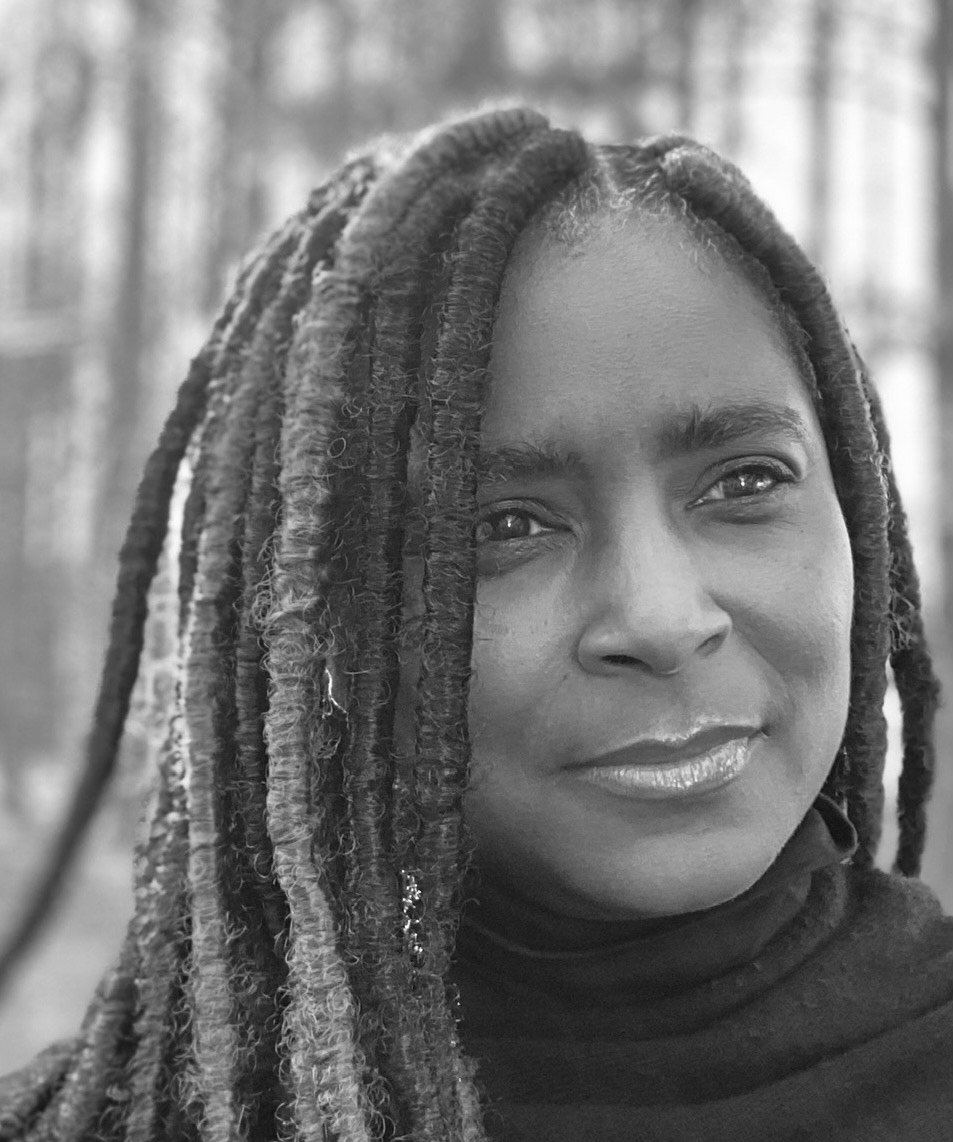Waves and Threads
Author Michele Evans
Review of purl by Michele Evans
by Gregory Luce
In Michele Evans’ fine debut poetry collection, purl (Finishing Line Press, February 2025), the poet weaves variations on the title word. To purl can mean to swirl, eddy, or curl as a shallow stream flows over stones, or a murmuring sound made by the motion of water. It can also mean to weave or knit with a reverse stitch looping along a border or edge or. thread made of gold or silver wire. The echo with “pearl,” while possibly not intentional, becomes apparent as the reader engages with the poems’ shimmering language.
Michele Evans, a fifth-generation Washingtonian, is a writer, teacher, and adviser for Unbound, an award-winning Northern Virginia high school literary magazine (no relation to Washington Unbound). This first book shows the benefits a poet derives from many years of teaching and working with student writers. In purl, Evans reimagines aspects of The Odyssey as well as other Greek myths, as a tribute “for those thick spines/ long lost in translation,/ past voices flooding present,/ bottled up sea glass blues,/ cloudy futures still battling/demons, monsters, and selves...” (“Dedication”). The book’s epigraph invokes Phillis Wheatley, an eighteenth century enslaved woman who became America’s first published poet, a reminder of those brought unwillingly across the ocean, voices silenced or ignored.
The first part of the collection, “swirl,” presents watery images called to mind in connection with ocean journeys, reminding us of the first definition of purl. “if you look carefully/ you just might see me/ bearing water stories….” (“aquaria”) (The use of lowercase for titles softens the poet’s voice, making her words yet more compelling while imparting a humility that draws us in to listen more carefully.)
Further along, the poet recalls the story of Theseus in “labyrinth”:
when i was a child,
mama told me:
sticks and stones
may break my bones
but words will never hurt me.
so i chose
a big grey stone
from a little tin bucket
not to throw
or break someone’s bones
but to write on it—
like it was paper….
and
i walked
in circles
made of sticks and stones
going nowhere
and everywhere
at the same time
clutching
my big grey stone
and simple white card
that read:
keep your
head
up and your heart
open.
it was those words
not sticks and stones
that hurt me.
this time
mama was wrong.
The budding poet has wandered into the labyrinth of language that hurts but —as we’ll see going forward—consoles and celebrates.
On the following two pages, this poem is shaped into two labyrinthine forms, one tightly coiled and the other airy and open, giving us alternate ways of considering the concept.
One of the legendary sirens of Odysseus’ story is given voice in “sirenia”:
i wail and warn,
sing and scream,
blare and blast,
pulse and pierce,
trumpet and toll,
four hundred years
without an orchestra
to amplify my arias
adrift in concert….
Wife to Odysseus and mother of Telemachus, Penelope is given her due, expressing her displeasure at the prolonged wait for her husband’s return from the war:
how i wish my son was a mama’s boy
so he could learn to love and not destroy
a woman's heart like his father did mine
twenty years ago when he left to fight
a battle far from our home’s coastline
leaving me alone to raise his son right.
(“penelopia”)
And Helen, whose abduction triggered the war that took Odysseus away from home, is brought on stage and given heroic status, in “helenia”:
her face once plastered on posters will soon grace dollar bills
for her efforts to break down slavery’s walls with epic trips
guided by a star and faith from the eastern shore through hills
upstate, freeing many once shackled to one thousand ships.
In part two of the book, “stich,” the chorus of women’s voices continues, including the poet’s own.
i rewrite their stories
to avoid sharing my own
autobiography — truths
hiding in plain sight
behind archetypes
greek, classical in nature
so different from my
heritage and culture
and yet also very much the same.
(“melancholia”)
This one passage sums up the poet’s achievement in presenting these timeless stories with modern psychological insight in clear contemporary language, simple yet polished to a sheen like the pearl that the collection’s title echoes. I’d love to be able to go on quoting and talking about the many fascinating reworkings of ancient tales but I leave it to the reader to follow up and experience the power and beauty by getting her own copy and perusing it carefully. One element of the attractiveness of the volume is the cover design and two illustrations inside the book, all by the poet’s very talented son, Harrison Evans.
You can buy a copy of purl directly from the publisher Finishing Line, here, or on Bookshop, here, which supports independent bookstores. Learn more about the author here.
Michele will be reading from her work on April 27 at the Reston Used Bookshop’s monthly series, “Reston Readings,” alongside Naomi Thiers and myself. The event is free and open to the public. It takes place from 5:30 – 6:30 pm at the bookshop, located at 1623 Washington Plaza North Lake Anne, Reston, VA 20190.
Michele Evans, a fifth-generation Washingtonian now residing in Northern Virginia, is a writer, teacher, and adviser for Unbound, an award-winning high school literary magazine. Her poems have appeared in Artemis Journal, Maryland Literary Review, Yellow Arrow Journal, Mid-Atlantic Review, Spoken Black Girl Magazine, Sky Island Journal, and elsewhere. purl is her first full-length poetry collection. Find her online at www.awordsmithie.com
Gregory Luce is a founder and editor of Washington Unbound. He is a poet living in Arlington, VA who has published six chapbooks, and numerous poems in print and online. He serves as Poetry Editor of The Mid-Atlantic Review. In addition to poetry, he writes a monthly column for the online arts journal Scene4.


